by M. C. Jennings | Mar 7, 2024 | Academics, Careers In..., COBA Faculty, College Decisions, Current Students, Dukes School of Finance, Financial Management, Uncategorized
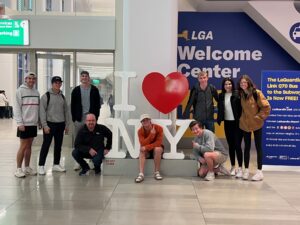 Most trips to New York City involve plenty of sightseeing, tours, shows and musicals, and expensive trips to some of the world’s best restaurants. They don’t usually involve sit-down meetings with some of the top financial minds in the country. But that was the design of a trip to New York last fall for eight students in ACU’s Dukes School of Finance.
Most trips to New York City involve plenty of sightseeing, tours, shows and musicals, and expensive trips to some of the world’s best restaurants. They don’t usually involve sit-down meetings with some of the top financial minds in the country. But that was the design of a trip to New York last fall for eight students in ACU’s Dukes School of Finance.
Those students – seven of whom are in the first cohort of the Dukes Scholars – were led on the trip by Dr. Jonathan Stewart, professor in the Dukes School of Finance. Stewart has been taking students to New York for several years, allowing them to visit some of the top financial institutions in the world and ask questions of the leaders of those companies to find out what it takes to make it in New York.
Stewart and his students were in New York from Oct. 18-22, visiting with leaders from Bank of America, Evercore, Court Square Capital Partners, Tiger Global Management, RBC Capital Markets, and Goldman Sachs. They toured Nasdaq and met with some of the leadership of the second-largest stock exchange in the world. They also met with a panel of young professionals in the finance industry who are members of the Manhattan Church of Christ.
“We had an opportunity to encourage and inspire those students to work in New York or another financial center,” Stewart said. “It’s all happening there (in New York), and we put our students in front of many talented people on the trip.
“We have a lot of students interested in investment banking, so going to Goldman Sachs and Royal Bank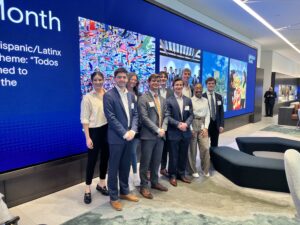 Canada (RBC) was great for them,” he said. “We went into RBC, where they set us up in the conference room, and we had people talking to us who were dealing in high-level investments and acquisitions daily.
Canada (RBC) was great for them,” he said. “We went into RBC, where they set us up in the conference room, and we had people talking to us who were dealing in high-level investments and acquisitions daily.
“Our students were able to interact with a wide range of people who had made a career out of that field, but also some in the room who were just a year or two older than our current students,” Stewart said. “That gave them a chance to interact with and ask questions of someone close to their age.”
Kaylee Smoot, a native of Corona, California, who will graduate in May with her Master’s in Accounting, said the time spent with executives of some of the top financial institutions in the country was invaluable.
“That time was priceless,” Smoot said. “We heard from many executives, including from specialized private equity firms and international finance companies, and even received a tour of the Goldman Sachs Headquarters. We had students ranging from first-year to graduate level, and we were each able to walk away with invaluable knowledge about what opportunities awaited us in our future careers.”
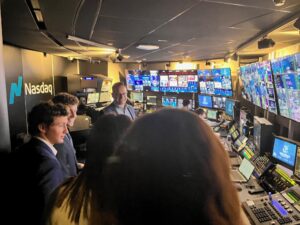 Stewart said he always gets help from ACU alums in the financial industry, using their connections and contacts with industry leaders in New York to set up the trip. One of those ACU graduates who helped this year was COBA alum Steve Swinney (‘94), based in Colorado and the CEO of Kodiak Building Partners who tapped his contacts in New York to meet with students from his alma mater.
Stewart said he always gets help from ACU alums in the financial industry, using their connections and contacts with industry leaders in New York to set up the trip. One of those ACU graduates who helped this year was COBA alum Steve Swinney (‘94), based in Colorado and the CEO of Kodiak Building Partners who tapped his contacts in New York to meet with students from his alma mater.
Swinney said he hoped his contacts showed the ACU students all that is possible for them in finance.
“The Dukes School of Finance at ACU is a tremendous opportunity for finance students to have so many career doors opened to them that maybe they haven’t had in the past,” he said. “I wanted them exposed to all that is possible for them. They must know their ACU education is preparing them for great things. We need excellent Christian finance leaders in the business world.”
A crucial part of the trip for Stewart and Smoot was discussing how faith and business mix. Stewart said that while making connections was paramount for the students, allowing those students to see that faith and high finance can mix was just as important. That’s why the panel with professed Christians who are also leaders in the financial industry was part of the tour. The time shared at Manhattan Church of Christ was to ensure the ACU students left New York knowing their faith wouldn’t be trampled in the City That Never Sleeps.
“Taking your faith into the business world might look different in New York than it would in Abilene or Dallas because there are so many perspectives and different points of view in a big city than in a place like Abilene,” Stewart said. “But to see there’s a place for Christian businessmen and businesswomen to function and contribute and be part of that world was, hopefully, a healthy opportunity for our students.”
Dallas because there are so many perspectives and different points of view in a big city than in a place like Abilene,” Stewart said. “But to see there’s a place for Christian businessmen and businesswomen to function and contribute and be part of that world was, hopefully, a healthy opportunity for our students.”
Smoot, who hopes to secure a financial analyst position in Dallas after graduation, said those conversations were the most important to her on the trip.
“In recent decades, we have seen the damage immoral and unethical behavior can do in the finance industry, with many people’s livelihoods still suffering the consequences,” she said. “To receive an education that equips you with the knowledge to be successful in finance while grounding you with Christ-centered values strengthens your chances of being a light for Christ in a world and industry that desperately needs it.
“We already see an example of this in the STAR course offered at ACU, a student-managed investment fund I had the honor of leading last semester,” Smoot said. “We are exposed to real-world dilemmas involving not only the quantitative side of the stock market but also the qualitative side of the finance industry as we discuss the financial and ethical motivations behind different investments we make on behalf of the university.”
New York City comes with preconceived notions, from the friendliness of its citizens to the high cost of living to safety. But by sitting down with those industry leaders, touring Nasdaq, taking in a show on Broadway, going through the 9/11 Museum, and giving the students time to explore the city, Stewart said he hopes the students began to see New York in a new light.
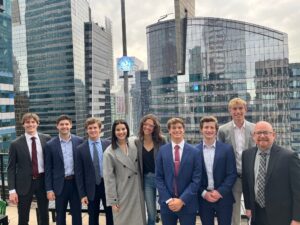 “We wanted the students to make real connections, and when you have eight students sitting in a room with three or four investment bankers, that’s a great opportunity,” Stewart said. “They had a real chance to talk to them, to exchange business cards, and network. There are so many stereotypes of New York, but it’s one of the world’s great cities, and having the experience of moving around and riding the subway and seeing the landmarks and everything that goes along with New York City was so much fun to share with those students. We see the cutthroat part of the financial industry in the movies and on TV all the time, and some of that is probably true. But many people are out there doing things the right way and have a faith background and a belief system, and they put that in action every day.”
“We wanted the students to make real connections, and when you have eight students sitting in a room with three or four investment bankers, that’s a great opportunity,” Stewart said. “They had a real chance to talk to them, to exchange business cards, and network. There are so many stereotypes of New York, but it’s one of the world’s great cities, and having the experience of moving around and riding the subway and seeing the landmarks and everything that goes along with New York City was so much fun to share with those students. We see the cutthroat part of the financial industry in the movies and on TV all the time, and some of that is probably true. But many people are out there doing things the right way and have a faith background and a belief system, and they put that in action every day.”
And for Smoot, putting some of those preconceived ideas to rest was just as important as anything else she took away from the trip.
“When you think of Wall Street, you may imagine exhausted employees working 100-plus hours a week, day trading at a giant corporation that becomes their only identity,” she said. “I’m happy I walked away realizing that while the finance industry in New York does require hard work and long hours, those individuals still have a life. And many of their companies offer impressive on-site benefits to assist with the burden long workdays may exert on them. It makes someone’s dream of working on Wall Street shift from daunting to doable, as long as you are willing to still chase after it.”
And each trip Stewart leads helps to re-energize him, he said.
“I love going to New York and being in the middle of everything,” said Stewart, who thanked Swinney, David Swearingen, and Jim Litton (‘01) for their help in setting up the schedule of tours and visits. “It’s the heart of the financial world, especially in our country. I learn something new on every trip, and I come back energized, inspired, and thinking about ways I can incorporate what we’ve learned on the trips into what we’re learning in the classroom. It inspires me to stand in front of our students and encourage them to dream big and do what they want to do because they can make it happen. We are fortunate to have many people here and ACU friends and family willing to help make that happen.”
Swearingen, and Jim Litton (‘01) for their help in setting up the schedule of tours and visits. “It’s the heart of the financial world, especially in our country. I learn something new on every trip, and I come back energized, inspired, and thinking about ways I can incorporate what we’ve learned on the trips into what we’re learning in the classroom. It inspires me to stand in front of our students and encourage them to dream big and do what they want to do because they can make it happen. We are fortunate to have many people here and ACU friends and family willing to help make that happen.”
by M. C. Jennings | Feb 21, 2024 | Academics, COBA Faculty, Current Students, Uncategorized
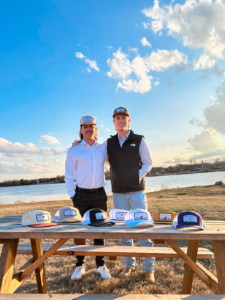 Long before Holden Rook and Brooks Gay were assigned a project in their entrepreneurship class requiring them to start a business, the roommates had already discussed starting their own venture.
Long before Holden Rook and Brooks Gay were assigned a project in their entrepreneurship class requiring them to start a business, the roommates had already discussed starting their own venture.
So when the class project met reality, they already had their plan ready.
Rook – a sophomore marketing major from The Woodlands – said the class brainstormed for “about 2-3 weeks” and then had to pitch the idea to Dr. Jim Litton, associate professor of Management Sciences and Director of the Griggs Center for Entrepreneurship & Philanthropy, who was teaching the entrepreneurship class.
“Brooks and I had expressed an interest in doing something before the class had even started, but it was Brooks who kick-started the idea in class,” Rook said. “Brooks was the brains behind the start of it since he’s from Abilene and knew the ins and outs of how to get our business started here locally.”
And that’s how Abilene Hat Company was born.
Gay – a junior business management major from Abilene – is a former baseball player at Abilene Wylie High School and last season at ACU, who had the original idea for a hat company.
“I wanted to create a hat company that represents Abilene and the surrounding areas because of the number of people who wear hats and how much pride people have in being from this area,” Gay said.
number of people who wear hats and how much pride people have in being from this area,” Gay said.
After making their pitch to Litton, getting approval, putting together a team, and dividing up responsibilities, the team – consisting of Gay, Rooks, ACU volleyball player Ashli Edmiston, Reece Westby, and Nick Schott – met about logistics and designs and began the process of giving life to the company.
“Our goal was to, first, make a good grade in the class,” Gay said. “We talked about our vision, bounced ideas off each other, and set our goals higher. We wanted to create the most revenue and profit in the current class and break the current record for revenue and profit ever in that class. We broke the current records and created the most revenue to date.”
The team is now just Gay and Rook, and they have moved the business forward to the point that they have a sales point online and in a storefront at Covey Apparel in Terrell, Texas.
“Our short-range goal was to find some local businesses willing to support another small business and give us a chance to get into their stores,” Rook said. “The long-term goal is to expand into all of West Texas to allow many people to see our brand.”
 The company’s most popular hat logo is a patch on a rope cap with the words “West Texas” atop a pump jack, an iconic symbol of one of the lifebloods of West Texas life.
The company’s most popular hat logo is a patch on a rope cap with the words “West Texas” atop a pump jack, an iconic symbol of one of the lifebloods of West Texas life.
“One of our long-term goals is to create different pieces of apparel with similar ideas and designs,” Gay said. “I want to represent where we are from, the pride the people of West Texas have by capturing those feelings and displaying them on a high-quality product. I believe the patch design with the oil rig does the best job of capturing the spirit of the hard-working people of West Texas.”
Gay and Rook said their COBA classes have given them insight into so many different aspects of running a business, from the entrepreneurial mindset to all the areas of running a company.
“The most beneficial things I’ve learned have been small pieces from numerous classes,” Gay said. “We use Excel to keep our books, we use marketing strategies in our social media, and many other entrepreneurship techniques from the classes I have taken.”
Rook echoed some of that when describing what he’s learned inside the walls of the Mabee Business Building.
“Definitely learned more about the entrepreneurial mindset,” Rook said. “You must be ready to adapt to the market and whatever it’s feeding you to succeed. Everything is always changing, and you must be ready to change.”
While Rook said the next stop is continued growth and perhaps adding additional employees, Gay said he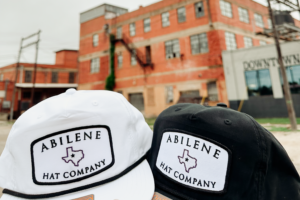 wants to expand the business into collegiate athletics, where Name, Image and Likeness (NIL) now allows student-athletes to promote products in exchange for money.
wants to expand the business into collegiate athletics, where Name, Image and Likeness (NIL) now allows student-athletes to promote products in exchange for money.
“That would not only be mutually beneficial for us and the student-athlete but will also significantly push our brand,” Gay said. “The athletes we are connected with at large schools have significant social media presence and will grow our total audience.”
To learn more about entrepreneurship at ACU, click here.
by M. C. Jennings | Feb 12, 2024 | Academics, Alumni Spotlight, Careers In..., COBA Staff, Management, Uncategorized
written by special contributor, Lance Fleming
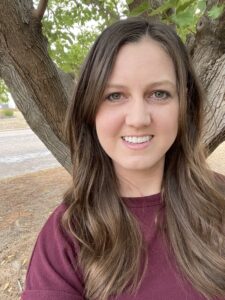 Whitney Herrington (’14) is a great believer in servant-leadership, which she saw exhibited every day while a COBA student at ACU. Perhaps that’s why she has spent the early part of her career in roles where she can best serve others, whether as the program director at a local non-profit working with women and children, as the assistant director of the Griggs Center, or in her current role as the Marketing and Development Director at Frontier Texas!.
Whitney Herrington (’14) is a great believer in servant-leadership, which she saw exhibited every day while a COBA student at ACU. Perhaps that’s why she has spent the early part of her career in roles where she can best serve others, whether as the program director at a local non-profit working with women and children, as the assistant director of the Griggs Center, or in her current role as the Marketing and Development Director at Frontier Texas!.
The emphasis on leaders serving others stuck with her, and she’s been giving back to her home community since she graduated with a Bachelor’s degree in Business Administration, and then in 2019 from the University of Victoria (British Columbia, Canada) with a Master’s in Global Business.
An Abilene native, Herrington graduated from Abilene High School in 2010 and enrolled at ACU that fall as a management major. In 2014 while finishing her degree, she began working as the A-Teens Director at the Alliance for Women and Children, working with middle-school girls during a 10-week summer camp and after-school care program. In her role, Herrington worked to help young women build their confidence and develop healthy self-esteem.
She was hired as the Assistant Director of the Griggs Center for Entrepreneurship & Philanthropy in the summer of 2016, where she worked as a teammate with many of the men and women she had taken classes under as a student just a few years before. One of those was Jim Litton, an Associate Professor in the Department of Management Sciences and the Director of the Griggs Center.
”One of the things I appreciated about my time working at the Griggs Center was that there was something new every day,” said Herrington, who worked there from 2016-19. “The energy of the students and the activity of the various projects was something I was fortunate to witness daily.”
Herrington worked closely with Litton and the Griggs Center team to implement the center’s strategic goals. She also worked on various projects, including organizing domestic trips to places like Silicon Valley in California, implementing communication strategies, and managing budgets and expense reports.
She began working at Frontier Texas! in November 2022 as the Marketing and Development Director, and even though the title is different, Herrington’s work as a servant-leader is ongoing. She works on fundraising events and connects with supporters, museum members, and donors, all to connect the community with the museum.
We recently caught up with Herrington to get her perspective on where she’s been, her experience at ACU and the Griggs Center, and her passion for entrepreneurship and servant leadership.
Q: What did you learn about yourself and working with people in that role at the Griggs Center?
Herrington: “The main thing I learned about working with people is that everyone sees the world differently, and being open to other ideas and different points of view is important. The beauty of the Griggs Center is that students (and faculty, staff, volunteers, etc.) can all benefit from thinking entrepreneurially. It’s a true skill that I am grateful I was able to continue developing during my employment. Even though I wasn’t a student, I learned each day. I always appreciated the entrepreneurial mindset and knew it would be a skill set I would value and continue to value no matter what job I held.”
Q: What professor or professors had the most profound impact on you and why?
Herrington: “This is such an interesting question because many COBA professors became my co-workers a few years after graduation! Jim Litton, of course, had a profound impact as a professor and employer. I took Jim’s Introduction to Entrepreneurship course my sophomore year, and that class was tough! But it taught me how to work through case studies at a higher level (which paid off during later undergraduate classes and into my Master’s program). As his employee, I appreciated how Jim created a supportive and collaborative work environment. Strategizing and implementing large-scale projects in such a fast-paced environment was fun. He genuinely valued the ability of our team to provide input on the projects and overall strategic plan for the Center.”
Q: What prompted you to work toward and attain your MBA?
Herrington: “As I worked in the world of academia, the thought of pursuing my Master’s degree was always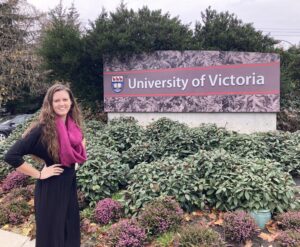 in the back of my mind. By the fall of 2019, it was time to earn that degree. I chose to study through a unique program, the Masters of Global Business, at the University of Victoria, located in British Columbia, Canada. The program is designed as a tri-continental program, where you spend several months in three countries. I started the program in January 2020, where I spent three months studying in British Columbia, but soon transitioned into a fully remote program because of the pandemic. I had always been interested in pursuing a post-graduate degree; it was just a matter of when. I have always believed in the idea of lifelong learning and wanted to broaden my knowledge base within business. I have a fascination with the global business community, and that is essentially what prompted me toward the Master of Global Business program.“
in the back of my mind. By the fall of 2019, it was time to earn that degree. I chose to study through a unique program, the Masters of Global Business, at the University of Victoria, located in British Columbia, Canada. The program is designed as a tri-continental program, where you spend several months in three countries. I started the program in January 2020, where I spent three months studying in British Columbia, but soon transitioned into a fully remote program because of the pandemic. I had always been interested in pursuing a post-graduate degree; it was just a matter of when. I have always believed in the idea of lifelong learning and wanted to broaden my knowledge base within business. I have a fascination with the global business community, and that is essentially what prompted me toward the Master of Global Business program.“
Q: Tell me about your role at Frontier Texas and what makes it work for you.
Herrington: “I started as the Marketing and Development Director at Frontier Texas in November of 2022. Some aspects of my job include developing and executing various fundraising events, writing grants, and working with our docent and volunteer base. I also assist in creating our marketing material, including our advertisements, brochures, website, and additional materials as needed. Helping maintain contact with our supporters, members, and donors is another highlight of this role as it allows me to connect with the community.”
Q: How are you applying the lessons you learned in COBA and the pursuit of your MBA to your role at Frontier Texas?
Herington: “One important lesson that I have continually been learning is the ability to be adaptable. That was especially relevant in the pursuit of my Master’s degree. My cohort shifted from a fully integrated, multi-cultural program to an online program. What I appreciated about that time, though, was that I was living out the case studies we were studying. Working in groups of individuals who were spread across the world added a level of learning in a global business context. Adapting to various opportunities and daily challenges is important in any field.”
Q: What are the lessons you learned while in COBA that you carried with you when you left ACU, and how have they shaped you in the years since you graduated?
Herrington: “It’s hard to put into words the lessons I learned while studying at COBA; it’s truly become a bit of a combination of lessons learned over time. I remember when working on a project researching the 2012 Olympic Legacy of the London Olympics. Dr. Monty Lynn was the professor and advisor for that project/course and was overseeing our research project and presentation. I remember seeing the hard work that he put into the project and creating this exciting opportunity for his students: it showed how dedication and commitment to a project are necessary no matter the stage of your career, whether you are a student or a CEO.”
Q: What do you appreciate most about your time at ACU and in COBA?
Herrington: “The opportunities to learn and grow into becoming a servant leader. The emphasis on servant leadership is a unique characteristic of COBA.”
by M. C. Jennings | Jan 31, 2024 | Academics, Alumni Spotlight, Athletics, Careers In..., COBA Faculty, College Decisions, Management
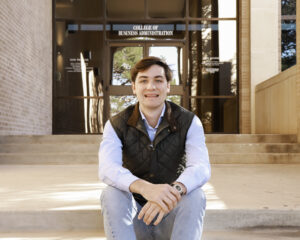 Growing up in Spain, Matias Montanes (‘23) knew he wanted to play tennis and play at the professional level. Spain is the home of great champions like current world No. 2 Carlos Alcaraz, 22-time Grand Slam champion Rafael Nadal, former world No. 1 Juan Carlos Ferrero, and doubles great Emilio Sanchez.
Growing up in Spain, Matias Montanes (‘23) knew he wanted to play tennis and play at the professional level. Spain is the home of great champions like current world No. 2 Carlos Alcaraz, 22-time Grand Slam champion Rafael Nadal, former world No. 1 Juan Carlos Ferrero, and doubles great Emilio Sanchez.
It’s a country steeped in tennis tradition, and Montanes wanted to be part of it. He began playing at a young age, and by the time he was 12, he was winning tournaments and was one of the top young players in his home country.
However, the time spent practicing took him away from other interests and made him realize that the dream of playing as a professional might not be what he wanted after all. He began to think about playing collegiately and pursuing his other dreams, like a college degree and perhaps a career as a lawyer.
That’s when he called ACU men’s head coach Juan Nunez (’09), and as soon as the two made a connection, Montanes knew he had found a new home. But two months before he was to arrive in Abilene for the start of his freshman year in the fall of 2020, he suffered a catastrophic elbow injury in a bike accident in Spain.
He came to ACU with the injury and Nunez honored his scholarship despite knowing that doctors in Spain said Montanes wouldn’t be able to play at a competitive level again. He tried to rehab the injury through the fall, but in December, he gave up tennis and began looking to return home to attend college in Spain.
But that’s when Nunez intervened and set Montanes on a path to something he truly loves: the law. As Matias explored this new road, he found mentors in faculty from ACU and COBA, especially Dr. Phil Vardiman (‘76) and Daniel Garcia (‘07). He graduated in December with a Bachelor of Business Administration (BBA), majoring in management with a minor in business leadership. Mattias has returned to Spain to study law in hopes that one day he can combine his ACU business degree with his law degree.
We recently talked to Matias and asked about his time as a tennis player, his experience at ACU and in COBA, and what’s next for him.
Q: Tell me about growing up in Spain, where you grew up, and what you wanted to be as an adult.
Montanes: I grew up in Menorca, Spain, and started playing tennis when I was four. My family and I moved to Mallorca when I was 10 because of my dad’s job. But that helped me improve my tennis game because I could practice with better tennis players and play at a good club.
Q: Growing up in Spain and playing tennis, did you have dreams of one day becoming the next Nadal or one of the other great players from Spain?
Montanes: When I was 12, I started to win Spanish and European championships. I was in the top three in Spain and maintained that level until I was 16. During that time, I beat players like Carlos Alcaraz (he’s number 2 in the world now), Arthur Cazaux (number 122 ATP right now), and Pablo Llamas (160 ATP right now). I wanted to be a professional tennis player, and that was everything I was seeing in my future. I practiced five hours per day every day of the week for six years. When I turned 17, I finally realized how hard it was to become a professional tennis player.
Q: Was tennis always the way you planned to get your education, and how did you come to learn about ACU?
Montanes: I had a hard-working mentality during my career, but that’s not enough. You must have something special, but I didn’t have it to get to that next level. I started to look for universities in the United States after I realized that. I had to find other goals in my life other than tennis. Tennis wasn’t going to provide me with a living. I started talking to some colleges, but as soon as I spoke with Juan Nunez, I knew that ACU was the place to go. Two months before I arrived at ACU, I had a bike accident, breaking my elbow into 18 pieces. The doctors had to put me in a cast and warned me that I wouldn’t be able to play tennis anymore. I didn’t want to believe them. I called Juan, and he didn’t believe them either. I traveled to Texas and visited more doctors. We had faith, but that wasn’t enough. I started to play tennis, and my elbow was getting worse every day. In December 2020, I decided to stop and start looking for colleges in Spain, but Juan allowed me to be his assistant coach, maintaining my scholarship.
Q: What were your first impressions of ACU and Abilene, and how did those change during the years you were here?
Montanes: My first semester, I didn’t like ACU. I came from the Catholic Church, and it was a change. I wanted to return to Spain; I had all my family, friends, and girlfriend there, but the opportunity Juan gave me was too big; one of those opportunities that only happens once in your life. Finally, I decided to stay. My tennis career changed in January 2021 when I started coaching as a freshman. As a second-year student, I began studying law in Spain, thanks to an online program. Being an assistant, attending Business school at ACU, and law school in Spain wasn’t easy, but I made it through.
Q: I know Dr. Phil Vardiman and Daniel Garcia were integral in your pursuit of a business management degree. Can you expound on how much those two men have impacted your life?
Montanes: I was lucky to have professors like Dr. Vardiman and Daniel. We made a special connection from the beginning. They knew everything I was going through and always supported me. They taught me life lessons without words but facts.
Q: What was the total COBA experience like for you, and what lessons did you learn that will stay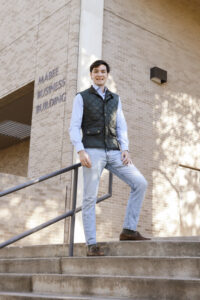 with you?
with you?
Montanes: I learned to be a servant business leader, a lesson I will always carry. I realized how good people can be in this world. Before coming to ACU, I never thought that people like this existed. But, thanks to ACU, I know the kind of husband, dad, and son I want to become. It took me some years, but now I’m conscious about it.
Q: How did you become interested in studying the law, and what kind of law degree are you working toward in Spain?
Montanes: I was always interested in law. If I had to choose a major in Spain, it would have been law. I saw the opportunity when I became an assistant because I wasn’t arriving home tired. I was coaching, not practicing. I think both majors (business and law) combine very well. You’d better know the law if you have your own business.
Q: How will you use your law degree, and do you want to merge your ACU degree with your law degree in your professional career?
Montanes: I’d like to find a business job with a multinational company and see how it looks in practice. Once I graduate from law school, I will decide whether to become a lawyer or use my law knowledge in a business position.
Q: What is the one thing you miss about Texas and ACU?
Montanes: The people. I miss the people at ACU and in Texas.
by M. C. Jennings | Dec 21, 2023 | Academics, COBA Faculty, Current Students, Marketing, Student Spotlights, Uncategorized
written by special contributor, Lance Fleming
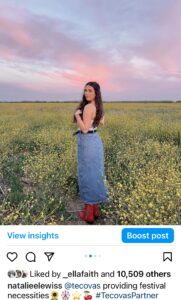 The pandemic of 2020 wreaked havoc on the global economy, shut down businesses and schools, drove employees to home offices, separated friends and family, and took most people away from their routines.
The pandemic of 2020 wreaked havoc on the global economy, shut down businesses and schools, drove employees to home offices, separated friends and family, and took most people away from their routines.
But in ways no one considered before COVID, it brought families closer together, allowed everyone to slow down and take care of themselves and each other, and gave everyone time to reflect and think. It’s also when Natalie Lewis decided on a career path.
During those days spent sitting in her parents’ home in The Woodlands, she turned to YouTube videos to pass the time. She focused on fashion and lifestyle YouTubers, which led her to follow those influencers on Instagram. That’s when she put the pieces together.
“I noticed those individuals had made a career out of creating content for their audience and brands that they love,” said Lewis, a senior marketing major from The Woodlands. “I knew that would be something I would love to do, so I decided to give it a shot.”
Lewis began her own Instagram page (@natalieelewiss), which not only chronicles her life, but also allows her to pass along lifestyle and fashion advice. She engages with other influencers through YouTube and Instagram, which she says is her favorite platform. That’s why she started on Instagram but will expand to YouTube after she graduates in May.
Her parents, Colter (‘95) and Elizabeth (‘96), have supported her post-college career decision, especially after she’s seen so much success – almost 15,000 followers – early in the process. Her mother helps Lewis create content, and her father helps her think through all the logistics of payment and pitching herself to different brands.
“My parents have watched my gradual build-up from simply getting free products to getting paid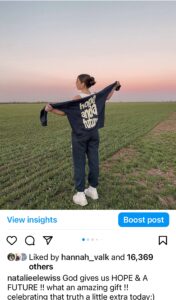 campaigns, and they were able to understand it better,” Lewis said. “They saw the hard work I put in behind the scenes of growing my platform and gained more respect for what I wanted to do. When I told them I wanted to pursue this career, they already understood it and saw that influencing is a fast-growing industry.”
campaigns, and they were able to understand it better,” Lewis said. “They saw the hard work I put in behind the scenes of growing my platform and gained more respect for what I wanted to do. When I told them I wanted to pursue this career, they already understood it and saw that influencing is a fast-growing industry.”
The influencer industry is relatively new, and she said the most important piece is finding a niche, a target audience, a social media platform that resonates with the audience, and constantly revamping the platforms for consistency. Lewis began slowly, posting outfit photos on Instagram because she wanted to step into the world of fashion content.
That made it easier to get brand collaborations from companies, who would look at her feed and see that her content aligned with their brand.
“Once I branded my Instagram, I started reaching out to small clothing brands and got rejected by some and accepted by others,” Lewis said. “Once companies had seen my work with other brands, they became more interested in working with me because of my credibility. And that has led me to work with bigger brands.”
 Lewis didn’t have a marketing plan when she started, just a passion for fashion and taking pictures. She began posting for fun because she was curious where the posts might lead. When Lewis found her passion, she researched how to grow her account and work with different brands. She didn’t write a marketing plan until her junior year at ACU.
Lewis didn’t have a marketing plan when she started, just a passion for fashion and taking pictures. She began posting for fun because she was curious where the posts might lead. When Lewis found her passion, she researched how to grow her account and work with different brands. She didn’t write a marketing plan until her junior year at ACU.
Lewis said no follower count or income level is required to be considered an influencer. Consistency in posting and connecting with the community, Lewis said, are most important in building a career as an influencer.
“It’s a mindset,” Lewis said. “If you want to be an influencer, you have to post like one, which is awkward at first. But you get used to it. I got my first brand deal with 3,000 followers and have seen many other creators work with brands with only 1,000 followers. You can be an influencer with only 1,000 followers and earning no money, just as long as you’re actively pursuing influencing. In my first year of content creation, I only received free products and earned no money. Consistency, engagement rate, community, and trustworthiness are how I would measure whether someone is an influencer.”
Her education in COBA, she said, has helped her learn how to market herself, implement those plans, and measure the growth of her brand.
“I’ve had a tremendous opportunity to build relationships with so many professors who have helped me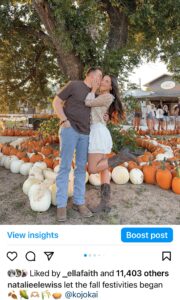 with this venture, specifically Dr. Jennifer Golden,” Lewis said. “She has helped me with my professional goals within the influencing industry. COBA has taught me how to market myself on social media. The biggest lessons I’ve learned are about personal branding, which is a crucial topic in the influencing industry because it sets one apart from millions of other influencers. The models and plans I’ve been taught in COBA have influenced my decision-making, steering me where I want to take my social media.”
with this venture, specifically Dr. Jennifer Golden,” Lewis said. “She has helped me with my professional goals within the influencing industry. COBA has taught me how to market myself on social media. The biggest lessons I’ve learned are about personal branding, which is a crucial topic in the influencing industry because it sets one apart from millions of other influencers. The models and plans I’ve been taught in COBA have influenced my decision-making, steering me where I want to take my social media.”
After she graduates from ACU, Lewis said she looks forward to expanding her niche into more lifestyle-based content (bridal, newly married, interior design, daily routine, family, etc.). She also said she wants to focus more on growing and creating the content she truly loves while continuing to create fashion content.
“I’m going to get a job after graduation while pursuing influencing on the side,” Lewis said. “However, I’m going to work hard to grow my platforms so that one day I’ll be able to quit my job and focus on influencing full-time. Creating content for my audience and working with brands I love is my biggest passion, so the end goal is to go into influencing full-time one day.”
by M. C. Jennings | Dec 20, 2023 | Academics, Accounting, Alumni Spotlight, Financial Management, Uncategorized
written by special contributor, Lance Fleming

Linebacker Jack Gibbens #50 of the Tennessee Titans during the preseason game between the Tennessee Titans and the Chicago Bears at Soldier Field on August 12, 2023 in Chicago, IL. Photo By Emily Starkey/Tennessee Titans
As a double major in accounting and financial management, Jack Gibbens’ (‘20) learned a lot about discipline and tenacity during his time in the College of Business as a student-athlete. That steadfast determination was something he’d need on the road to the National Football League, which wasn’t as smooth as that of others he plays with as a member of the Tennessee Titans. But in the NFL – as Gibbens has heard over and over – it’s not about how you got to the league, it’s about what you do when you get there.
And despite being cut at the end of the Titans’ training camp in 2022, the former ACU Wildcat standout has finally earned his spot in the league as a starting linebacker for the Titans. He’s started all but one game this season for the Titans after playing in the team’s final five games in 2022.
Gibbens was a standout at ACU from 2017-20 and then spent his graduate season (2021) as a starting linebacker at the University of Minnesota, where he was an honorable mention All-Big Ten Conference selection and earned his master’s degree in accounting. He wasn’t drafted in 2022 but signed as a free agent with the Titans after the draft, and for most of training camp, it looked like he might make the final roster.
He quickly became a favorite of head coach Mike Vrabel, who dubbed him “Dr. Gibby” because of his intelligence. The former ACU Academic All-American had made an impression on the veteran head coach.
“He’s smart, answered all the questions, and then said, ‘Coach, I wasn’t in pre-med,’ “Vrabel said. “I told him I knew and that it was a joke.”
Gibbens has spent his career – both in college and now as a professional – using his athleticism and intelligence to reach the pinnacle in football: a starting spot in the NFL. A native of Bulverde, Texas, Gibbens quickly earned a starting spot for the Wildcats and played in 39 games over four years, earning all-conference honors and academic All-America accolades.
He went through the Titans’ training camp in 2022 but was one of the final cuts made before the regular season started. He was re-signed to the team’s practice squad on Sept. 12, 2022, and was promoted to the active roster on Dec. 10, 2022, making his NFL debut in their Dec. 11 game against Jacksonville. Just one year later, Gibbens is a mainstay in the middle of the Titans’ defense, having earned a starting spot over other veterans.
“Coach Vrabel continually preaches that it doesn’t matter how we got here; it’s what you do when you get an opportunity,” Gibbens said. “It’s been a journey to get to this place in my life. I was cut last year and then spent some time on the practice squad before I finally got an opportunity to play. Now, I’m playing a completely different role as a starter. I’m trying to keep the same process, which is to put my head down, keep working, and get better every day.”
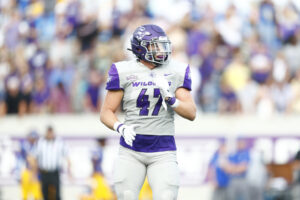
Photo by Jeremy Enlow/Abilene Christian University
We recently had the chance to catch up with Gibbens, who spoke about his time at ACU (where he carried a 4.0 grade point average in accounting and financial management) as well as what he’s learned about managing his money in the NFL.
Q: You spent a lot of time in the Mabee Business Building while at ACU. Could you tell me about your experience in COBA and your gratitude for what you learned under those professors?
Gibbens: “When I think about my time in COBA, I am most appreciative of the amazing people I was surrounded by each day. The small class sizes allowed me to get to know my classmates and professors on a more personal basis. I am extremely grateful to my professors not only for teaching me about business but for their interest and investment in me as a person.”
Q: What are some of your biggest takeaways from your time in COBA?
Gibbens: “Probably learning how to combine business with my personal beliefs, interests, and values. Being in a Christ-centered environment was a huge blessing that allowed me to be myself and grow in knowledge and as a person.”
Q: When you think back on your time in COBA, who are the professors that stand out, and what life lessons did you take away from them?
Gibbens: “I had many professors who impacted my life, but two in particular stick out. Clint Buck had a huge impact in making it feel like home. He taught my first class at ACU and made me feel at home on campus by developing a personal relationship with me and praying for/ with me as I adjusted to college. And Andy Little. I appreciate the way he challenged my thinking and pushed me to form and defend opinions.”
Q: How difficult was it to balance getting ready to play a game on Saturday and studying to maintain a 4.0 GPA?
Gibbens: “Balancing those two was a challenge when trying to succeed at the highest level. Being a student-athlete taught me great lessons about time management and work ethic. I quickly learned the importance of being in the moment and fully investing myself in the task at hand.”
Q: When you played at the University of Minnesota, how much more difficult was the dual life of student and athlete?
Gibbens: “The adjustment from high school to college was much more difficult than my transition to Minnesota. Adjusting to life as a collegiate student-athlete is so different athletically, academically, and in everyday life from when you were in high school. Moving to Minnesota was much easier because I had already learned how to be successful in that lifestyle.”
Q: Now that you’ve moved into the NFL, with your background and major, how much are you watching your finances and where your money is going?
Gibbens: “Having a background in accounting and finance has caused me to have a huge interest in my finances. What I studied in college gave me a great foundation to make good financial decisions and understand the importance of budgeting, investing, and preparing for life after football.”
Q: A lot of guys in your position turn it over to a financial advisor and then don’t know anything about it. Did you determine early on you weren’t going to do that?
Gibbens: “The NFL is unlike any other profession because it creates specific challenges and opportunities from a financial perspective. To help me navigate this unique financial landscape I have hired a financial advisor who specifically works with athletes and understands my specific needs.”
Q: Going back to your ACU days: what did ACU and the experiences in COBA, football, and student life in general mean to you?
Gibbens: “Those times at ACU are some of the best years of my life. I made memories and friendships that I will carry with me for the rest of my life and, for that, I am extremely grateful for ACU.”
 Most trips to New York City involve plenty of sightseeing, tours, shows and musicals, and expensive trips to some of the world’s best restaurants. They don’t usually involve sit-down meetings with some of the top financial minds in the country. But that was the design of a trip to New York last fall for eight students in ACU’s Dukes School of Finance.
Most trips to New York City involve plenty of sightseeing, tours, shows and musicals, and expensive trips to some of the world’s best restaurants. They don’t usually involve sit-down meetings with some of the top financial minds in the country. But that was the design of a trip to New York last fall for eight students in ACU’s Dukes School of Finance.  Canada (RBC) was great for them,” he said. “We went into RBC, where they set us up in the conference room, and we had people talking to us who were dealing in high-level investments and acquisitions daily.
Canada (RBC) was great for them,” he said. “We went into RBC, where they set us up in the conference room, and we had people talking to us who were dealing in high-level investments and acquisitions daily.  Stewart said he always gets help from ACU alums in the financial industry, using their connections and contacts with industry leaders in New York to set up the trip. One of those ACU graduates who helped this year was COBA alum Steve Swinney (‘94), based in Colorado and the CEO of Kodiak Building Partners who tapped his contacts in New York to meet with students from his alma mater.
Stewart said he always gets help from ACU alums in the financial industry, using their connections and contacts with industry leaders in New York to set up the trip. One of those ACU graduates who helped this year was COBA alum Steve Swinney (‘94), based in Colorado and the CEO of Kodiak Building Partners who tapped his contacts in New York to meet with students from his alma mater.  Dallas because there are so many perspectives and different points of view in a big city than in a place like Abilene,” Stewart said. “But to see there’s a place for Christian businessmen and businesswomen to function and contribute and be part of that world was, hopefully, a healthy opportunity for our students.”
Dallas because there are so many perspectives and different points of view in a big city than in a place like Abilene,” Stewart said. “But to see there’s a place for Christian businessmen and businesswomen to function and contribute and be part of that world was, hopefully, a healthy opportunity for our students.”  “We wanted the students to make real connections, and when you have eight students sitting in a room with three or four investment bankers, that’s a great opportunity,” Stewart said. “They had a real chance to talk to them, to exchange business cards, and network. There are so many stereotypes of New York, but it’s one of the world’s great cities, and having the experience of moving around and riding the subway and seeing the landmarks and everything that goes along with New York City was so much fun to share with those students. We see the cutthroat part of the financial industry in the movies and on TV all the time, and some of that is probably true. But many people are out there doing things the right way and have a faith background and a belief system, and they put that in action every day.”
“We wanted the students to make real connections, and when you have eight students sitting in a room with three or four investment bankers, that’s a great opportunity,” Stewart said. “They had a real chance to talk to them, to exchange business cards, and network. There are so many stereotypes of New York, but it’s one of the world’s great cities, and having the experience of moving around and riding the subway and seeing the landmarks and everything that goes along with New York City was so much fun to share with those students. We see the cutthroat part of the financial industry in the movies and on TV all the time, and some of that is probably true. But many people are out there doing things the right way and have a faith background and a belief system, and they put that in action every day.”  Swearingen, and Jim Litton (‘01) for their help in setting up the schedule of tours and visits. “It’s the heart of the financial world, especially in our country. I learn something new on every trip, and I come back energized, inspired, and thinking about ways I can incorporate what we’ve learned on the trips into what we’re learning in the classroom. It inspires me to stand in front of our students and encourage them to dream big and do what they want to do because they can make it happen. We are fortunate to have many people here and ACU friends and family willing to help make that happen.”
Swearingen, and Jim Litton (‘01) for their help in setting up the schedule of tours and visits. “It’s the heart of the financial world, especially in our country. I learn something new on every trip, and I come back energized, inspired, and thinking about ways I can incorporate what we’ve learned on the trips into what we’re learning in the classroom. It inspires me to stand in front of our students and encourage them to dream big and do what they want to do because they can make it happen. We are fortunate to have many people here and ACU friends and family willing to help make that happen.” Long before Holden Rook and Brooks Gay were assigned a project in their
Long before Holden Rook and Brooks Gay were assigned a project in their  number of people who wear hats and how much pride people have in being from this area,” Gay said.
number of people who wear hats and how much pride people have in being from this area,” Gay said. The company’s most popular hat logo is a patch on a rope cap with the words “West Texas” atop a pump jack, an iconic symbol of one of the lifebloods of West Texas life.
The company’s most popular hat logo is a patch on a rope cap with the words “West Texas” atop a pump jack, an iconic symbol of one of the lifebloods of West Texas life. wants to expand the business into collegiate athletics, where Name, Image and Likeness (NIL) now allows student-athletes to promote products in exchange for money.
wants to expand the business into collegiate athletics, where Name, Image and Likeness (NIL) now allows student-athletes to promote products in exchange for money. Whitney Herrington (’14) is a great believer in servant-leadership, which she saw exhibited every day while a COBA student at ACU. Perhaps that’s why she has spent the early part of her career in roles where she can best serve others, whether as the program director at a local non-profit working with women and children, as the assistant director of the Griggs Center, or in her current role as the Marketing and Development Director at Frontier Texas!.
Whitney Herrington (’14) is a great believer in servant-leadership, which she saw exhibited every day while a COBA student at ACU. Perhaps that’s why she has spent the early part of her career in roles where she can best serve others, whether as the program director at a local non-profit working with women and children, as the assistant director of the Griggs Center, or in her current role as the Marketing and Development Director at Frontier Texas!. in the back of my mind. By the fall of 2019, it was time to earn that degree. I chose to study through a unique program, the Masters of Global Business, at the University of Victoria, located in British Columbia, Canada. The program is designed as a tri-continental program, where you spend several months in three countries. I started the program in January 2020, where I spent three months studying in British Columbia, but soon transitioned into a fully remote program because of the pandemic. I had always been interested in pursuing a post-graduate degree; it was just a matter of when. I have always believed in the idea of lifelong learning and wanted to broaden my knowledge base within business. I have a fascination with the global business community, and that is essentially what prompted me toward the Master of Global Business program.“
in the back of my mind. By the fall of 2019, it was time to earn that degree. I chose to study through a unique program, the Masters of Global Business, at the University of Victoria, located in British Columbia, Canada. The program is designed as a tri-continental program, where you spend several months in three countries. I started the program in January 2020, where I spent three months studying in British Columbia, but soon transitioned into a fully remote program because of the pandemic. I had always been interested in pursuing a post-graduate degree; it was just a matter of when. I have always believed in the idea of lifelong learning and wanted to broaden my knowledge base within business. I have a fascination with the global business community, and that is essentially what prompted me toward the Master of Global Business program.“ Growing up in Spain, Matias Montanes (‘23) knew he wanted to play tennis and play at the professional level. Spain is the home of great champions like current world No. 2 Carlos Alcaraz, 22-time Grand Slam champion Rafael Nadal, former world No. 1 Juan Carlos Ferrero, and doubles great Emilio Sanchez.
Growing up in Spain, Matias Montanes (‘23) knew he wanted to play tennis and play at the professional level. Spain is the home of great champions like current world No. 2 Carlos Alcaraz, 22-time Grand Slam champion Rafael Nadal, former world No. 1 Juan Carlos Ferrero, and doubles great Emilio Sanchez. with you?
with you?
 campaigns, and they were able to understand it better,” Lewis said. “They saw the hard work I put in behind the scenes of growing my platform and gained more respect for what I wanted to do. When I told them I wanted to pursue this career, they already understood it and saw that influencing is a fast-growing industry.”
campaigns, and they were able to understand it better,” Lewis said. “They saw the hard work I put in behind the scenes of growing my platform and gained more respect for what I wanted to do. When I told them I wanted to pursue this career, they already understood it and saw that influencing is a fast-growing industry.” Lewis didn’t have a marketing plan when she started, just a passion for fashion and taking pictures. She began posting for fun because she was curious where the posts might lead. When Lewis found her passion, she researched how to grow her account and work with different brands. She didn’t write a marketing plan until her junior year at ACU.
Lewis didn’t have a marketing plan when she started, just a passion for fashion and taking pictures. She began posting for fun because she was curious where the posts might lead. When Lewis found her passion, she researched how to grow her account and work with different brands. She didn’t write a marketing plan until her junior year at ACU. with this venture, specifically Dr. Jennifer Golden,” Lewis said. “She has helped me with my professional goals within the influencing industry. COBA has taught me how to market myself on social media.
with this venture, specifically Dr. Jennifer Golden,” Lewis said. “She has helped me with my professional goals within the influencing industry. COBA has taught me how to market myself on social media.
